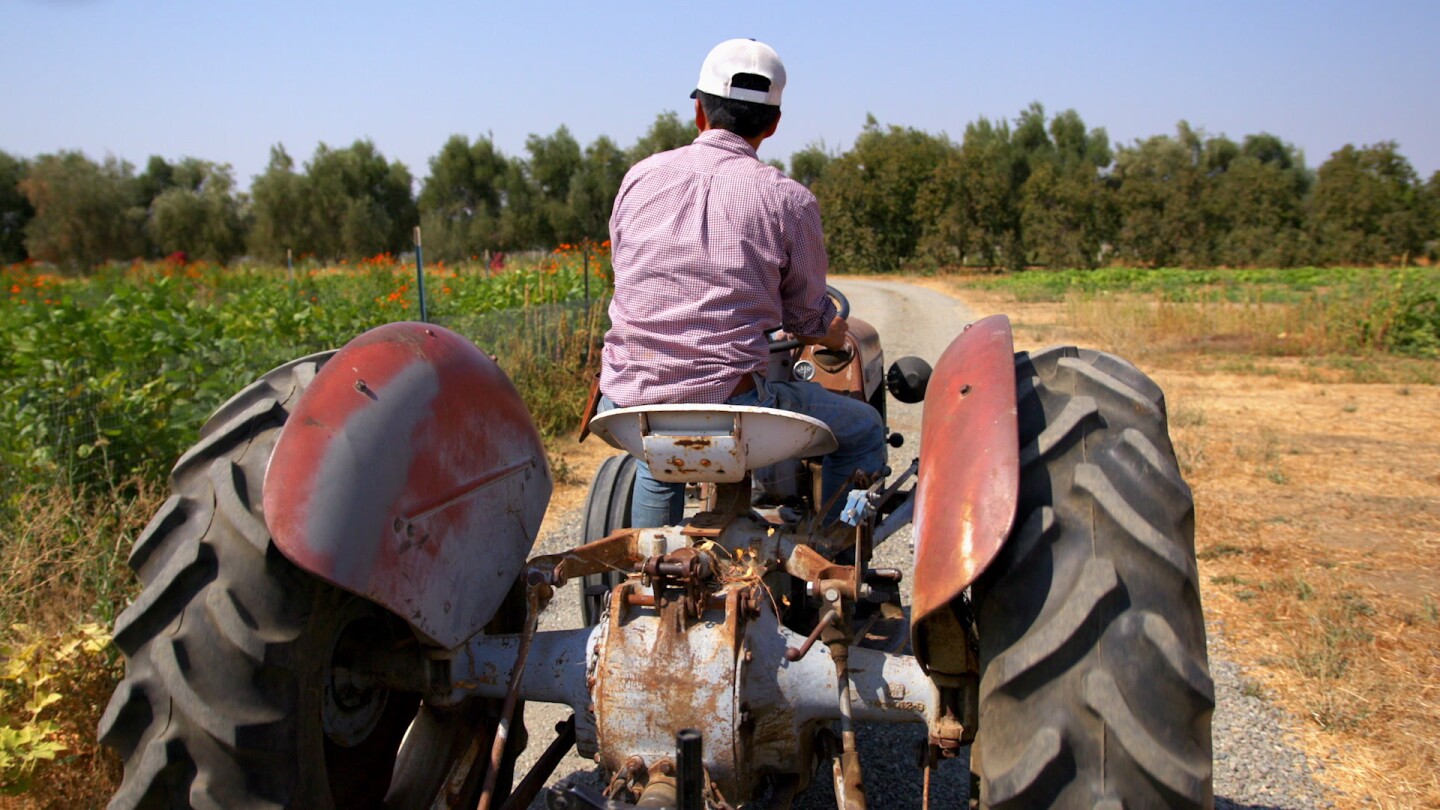
60% of the World's Seeds are Owned by Corporations. How Farmer Kristyn Leach is Resisting.
Namu Farms in Winters, California is one of several small farms cultivating Asian heritage vegetables. The 10-year-old farm is run by Kristyn Leach, who is Korean American. The farm grows 50 varieties of fruits, vegetables and herbs a year, providing year-round produce mainly to Namu Stonepot, a Korean restaurant in San Francisco.
Before Namu Farms, Leach had worked mostly as a farmhand in small vegetable farms in Washington State. Out of curiosity, Leach began planting Korean heritage vegetables and herbs. Leach, a Korean adoptee, started noticing at a community garden in Seattle's International District that one common herb grown was perilla. "Even if the farmer isn't there, you could tell where they came from," Leach said.
When she moved to California in 2009, she worked part-time at local East Bay restaurants because there was no full-time work on farms during the wintertime. While Leach had no professional culinary training, she brought a lot of farming knowledge. Working as a prep cook, she met a lot of "young, interesting Asian American cooks and chefs who were starting to be in leadership at restaurants," Leach said.
One of the places she worked at was Camino, a wood-fire restaurant in Oakland that was run by Russell Moore and Allison Hopelain. "I'd never even eaten at a restaurant the caliber of Camino," Leach said. Leach began bringing ingredients like perilla to Moore, who is part-Korean. Leach had grown the leaves herself and wanted to see if the chef wanted to incorporate in the restaurant's menu. Eventually, Camino started incorporating perilla, Japanese shiso, burdock root, Korean melons and bitter melon. "The perilla had a great impact on the staff and me — we used in it in so many ways, often combined with other sweeter herbs like basil or mint," Moore said. One of the dishes was a squid with perilla or salads with Korean melon. Moore now operates another restaurant in Oakland called The Kebabery, where they use Leach's produce.
At Camino, she also met Brandon Jew, the Michelin-starred chef of Mister Jiu's in San Francisco's Chinatown. "I remember he was just so nice and friendly. He was just being really encouraging in terms of providing me some sort of vision."
Leach wanted to carve out a niche to start her own farm one day, but the dream seemed out of reach with the high cost of owning farmland until she met the Lee brothers, David, Dennis and Daniel Lee of Namu Restaurant Group. The Namu brothers owned Namu Gaji in the Mission district in San Francisco and Sunset Squares Pizza. (After an almost 10-year run, Namu Gaji shuttered in April 2021.) The Lee brothers opened Namu Stonepot in the SoMa district in 2020, where Leach's produce and herbs are now featured in their banchan, gochujang and kimchi.
Namu initially contracted Leach to grow Korean chili peppers, but has since then expanded to include perilla and other produce. From there, she began subleasing land in Sunol within the county of Alameda from her other boss, a farmer. Namu invested in the money to sublease the land and Leach made sure to pay back the investment through production.
Through that successful partnership, Leach began giving away produce boxes to different Asian American community organizations. Her enthusiasm and drive is one that continue to inspire those she works with. "I have tremendous respect and love for Kristyn," said Dennis, "She has been an inspiration and vital member of our community giving life and sharing a sense of purpose for many years."
Vegetables are in danger of being lost to future generations.Kristyn Leach of Namu Farms
Leach then started Seed Stewards and a small CSA program in 2020 during the pandemic that was funded by a grant, to give away farm boxes for free to families in the Bay Area. They worked mostly with Korean Americans, Filipino American and Vietnamese American communities including a Filipino-focused summer camp. "For me, it's personally enriching for these families have intergenerational conversations. Each box comes with interview questions. And just getting kids excited to eat vegetables. If I can say I just got kids excited to eat bitter melon and the parents can cook it, I can die happy," Leach said.
Seed Stewards became a collectively organized project in 2021. Along with five other BIPOC small farmers, Seed Stewards focuses on Asian and Palestinian crops. The program helps small farmers and their families connect to each other and to the stories behind their seeds through conversations, story sharing, recipes, virtual potlucks and farm tours.
The program gives seeds to "stewards" who are interested in growing and using the produce, "trying different vegetables and preparing them but in a way that helps us with seed improvement and plant breeding," Leach said. The idea is that the community influences the taste and what is grown helps to develop conversations around plant breeding that is not top-down.

Leach previously partnered with Kitazawa Seed Co., a 100-year-old seed company based in Oakland that was founded by two Japanese American brothers and focuses on Asian vegetables. Second Generation Seeds (which includes Seed Stewards) is a project out of that work. While Leach is no longer active at Kitazawa, she continues to work on Second Generation Seeds and said Kitazawa gave her "a place to experiment."
All of this work is important because the varieties of fruits, vegetables and herbs that are grown and eaten are declining, Leach said. For example, 60% of the world's seeds are owned by four corporations, Leach said.
Leach feels that seed diversity is necessary to keep biodiversity alive — and to keep culture and traditions alive. "If you control seed, you control food."
She credits the work of small farmers and peasants working to maintain seeds. "They are not in this Western framework. Cultural diversity is not just existing to be a woke talking point. It really is completely important on a basic science level. Talk of equity in these circles focuses merely on representation, and not on understanding that culturally diverse perspectives affect how much biodiversity we can maintain and build."
Globally, she points to farmers keeping thousands of varieties and the heritage seed movement in Korea. "Vegetables are in danger of being lost to future generations," she said about what's at stake as far as plant diversity.

When asked about what there is to look forward to, Leach is optimistic. "I think there's more awareness in the general population. Just in the past two years, how top of mind it is for people thinking about climate disaster; it's been nonstop devastation, coupled with the pandemic. People are more personally affected by this climate chaos."
Leach admits that not everyone wants to face the reality. "Sometimes as a farmer, you just feel you're always the person who's a downer at the party going on about a depressing diatribe about the end of times," she said.
Leach also points to small farmers in the United States growing crops outside of the large commodity farms, including immigrant communities keeping seeds and varieties alive. So many diverse immigrant communities in the U.S. interested in this work of preserving seeds as a pathway and link to heritage.
As a second-generation Asian American farmer, Leach notes that many Asian immigrant farmers, sometimes intergenerational family farms, came before her. "In many ways, the challenges have stayed somewhat constant, but there's been different changes in the landscape in terms of discussion around race, farming and food justice."
There's an existential longing for ancestral connection. I think people are starting to reflect and articulate more clearly about how important those connections are.Kristyn Leach of Namu Farms
"Conditions for people my generation and younger generation is infinitely better than what a lot of immigrant farming communities have faced in the past. There's an existential longing for ancestral connection. I think people are starting to reflect and articulate more clearly about how important those connections are."
Though conditions have changed, Leach also notes that immigrant farming communities are still disproportionately impacted by injustices, including exploitation of farm labor on recent immigrant and refugee populations.
"What seems most clear is that younger generations are recognizing and valuing the role that food and plants play in our overall survival strategies and long for sustained relationship with land," Leach adds.
Leach points to an older Korean American farmer she previously worked for, growing melons and mushrooms. "She's surprised there's so much of a market, people starting to appreciate — even non-Koreans — this produce. She's my parents' age. That's how much can shift in one generation. In these small ways, the needle is moving a little bit."





